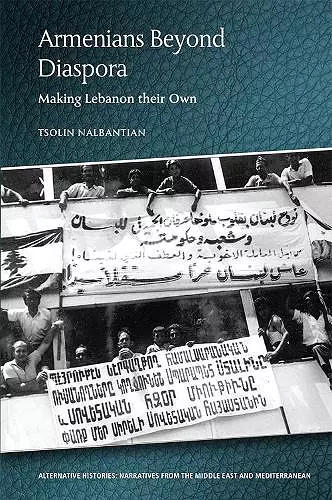Armenians Beyond Diaspora
Making Lebanon their Own
Format:Paperback
Publisher:Edinburgh University Press
Published:31st Aug '21
Should be back in stock very soon

This book argues that Armenians around the world – in the face of the Genocide, and despite the absence of an independent nation-state after World War I – developed dynamic socio-political, cultural, ideological and ecclesiastical centres. And it focuses on one such centre, Beirut, in the postcolonial 1940s and 1950s. Tsolin Nalbantian explores Armenians’ discursive re-positioning within the newly independent Lebanese nation-state; the political-cultural impact (in Lebanon as well as Syria) of the 1946–8 repatriation initiative to Soviet Armenia; the 1956 Catholicos election; and the 1957 Lebanese elections and 1958 mini-civil war. What emerges is a post-Genocide Armenian history of – principally – power, renewal and presence, rather than one of loss and absence.
What emerges (from this book) is a post-Genocide Armenian history of - principally - power, renewal and presence, rather than one of loss and absence. * Armenian Voice *
While “diaspora,” as Khachig Tololyan has written, is useful to “think with,” what would it be to think without? Or, as Tsolin Nalbantian urges in her remarkable new book, to think beyond? -- Sylvia Angelique Alajaji * Journal of the Society for Armenian Studies *
Armenians Beyond Diaspora is an important contribution to both Armenian Studies and Lebanese historiography, and through it, Nalbantian offers an exciting new path for how minority communities, rather than serving as footnotes to national or regional histories, can be better understood as socially and politically integral parts of those same histories. -- Sean Lee * Mediterranean Politics *
Armenians Beyond Diaspora is a major contribution to the field of Middle Eastern Studies. Nalbantian situates Armenians of Lebanon in the larger context of the Middle East during the Cold War period. Through her unique ability of analyzing the political discourse of the time, Nalbantian demonstrates how the bi-polar system had serious ramifications on Lebanon and its Armenian citizens. In this journey between time and space, the local and global, Nalbantian weaves together a narrative that combines history and anthropology in telling the story of a community which has been marginalized in the mainstream historiography of the Middle East in general and Lebanese historiography in particular. -- Bedross Der Matossian, University of Nebraska-Lincoln
ISBN: 9781474458573
Dimensions: unknown
Weight: unknown
240 pages